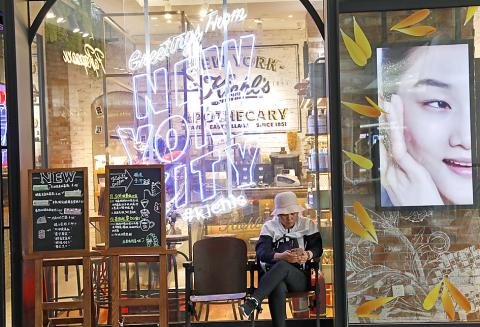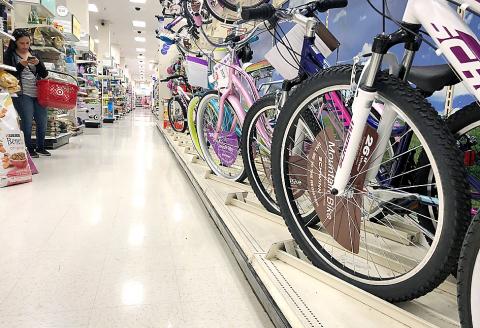The US prepared to hit China with new tariffs even as US President Donald Trump said he would meet Chinese President Xi Jinping (習近平) at next month’s G20 summit, an encounter that could prove pivotal in a deepening clash over trade.
The US Trade Representative’s (USTR) office on Monday released a list of about US$300 billion of Chinese goods, including children’s clothing, toys, mobile phones and laptops, that Trump has threatened to hit with a 25 percent tariff.
If the president proceeds with the tariffs, it would see almost all imports from China covered by punitive duties.

Photo: EPA-EFE
It also would turn the president’s trade disputes into a tangible reality for many Americans as he seeks re-election.
At the same time, Trump is sounding optimistic about the chances of a deal.
“When the time is right we will make a deal with China. My respect and friendship with President Xi is unlimited but, as I have told him many times before, this must be a great deal for the United States or it just doesn’t make any sense,” he tweeted yesterday.

Photo: AFP
Under a process outlined by US officials, the new tariffs would not take effect until late next month at the earliest, but that could come just as Trump meets with Xi on the sidelines of a G20 meeting on June 28 and 29 in Osaka, Japan, raising the stakes in an already escalating trade war.
Trump earlier on Monday warned Beijing not to go too far in responding to US trade actions, after his move last week to increase import duties on a separate US$200 billion tranche of imports from China.
“There can be some retaliation, but it can’t be very substantial,” Trump told reporters at the White House during a meeting with Hungarian Prime Minister Viktor Orban.
The release of the additional tariffs list and the continuing escalation it signals drew an outcry from business groups that have been lobbying against the duties.
The USTR said that the new tariffs would not apply to pharmaceuticals or rare earths.
“We support the administration’s efforts to deliver a meaningful trade agreement that levels the playing field for American businesses and workers,” National Retail Federation president and CEO Matthew Shay said in a statement. “But the latest tariff escalation is far too great a gamble for the US economy.”
Economists have warned that the existing tariffs would hurt US growth, but they are also worried an escalation to cover all trade from China and the Chinese retaliation it would provoke would do far more damage and could even tip the US economy into recession.
China on Monday announced plans to raise duties on about US$60 billion in US imports starting June 1, defying a call from Trump to resist escalating the trade dispute.
Less than two hours after Trump tweeted a warning that “China should not retaliate — will only get worse!” the Chinese Ministry of Finance unveiled the measures on its Web site.
The new rate of 25 percent is to apply to 2,493 US products, with other goods subject to duties ranging from 5 percent to 20 percent, it said.
Higher US tariffs would drive up the US Federal Reserve’s preferred measure of underlying inflation, and further escalation could raise consumer prices even more and dent US growth, Goldman Sachs Group Inc economists said in a research note.

MAKING WAVES: China’s maritime militia could become a nontraditional threat in war, clogging up shipping lanes to prevent US or Japanese intervention, a report said About 1,900 Chinese ships flying flags of convenience and fishing vessels that participated in China’s military exercises around Taiwan last month and in January have been listed for monitoring, Coast Guard Administration (CGA) Deputy Director-General Hsieh Ching-chin (謝慶欽) said yesterday. Following amendments to the Commercial Port Act (商港法) and the Law of Ships (船舶法) last month, the CGA can designate possible berthing areas or deny ports of call for vessels suspected of loitering around areas where undersea cables can be accessed, Oceans Affairs Council Minister Kuan Bi-ling (管碧玲) said. The list of suspected ships, originally 300, had risen to about 1,900 as

DAREDEVIL: Honnold said it had always been a dream of his to climb Taipei 101, while a Netflix producer said the skyscraper was ‘a real icon of this country’ US climber Alex Honnold yesterday took on Taiwan’s tallest building, becoming the first person to scale Taipei 101 without a rope, harness or safety net. Hundreds of spectators gathered at the base of the 101-story skyscraper to watch Honnold, 40, embark on his daredevil feat, which was also broadcast live on Netflix. Dressed in a red T-shirt and yellow custom-made climbing shoes, Honnold swiftly moved up the southeast face of the glass and steel building. At one point, he stepped onto a platform midway up to wave down at fans and onlookers who were taking photos. People watching from inside

Japan’s strategic alliance with the US would collapse if Tokyo were to turn away from a conflict in Taiwan, Japanese Prime Minister Sanae Takaichi said yesterday, but distanced herself from previous comments that suggested a possible military response in such an event. Takaichi expressed her latest views on a nationally broadcast TV program late on Monday, where an opposition party leader criticized her for igniting tensions with China with the earlier remarks. Ties between Japan and China have sunk to the worst level in years after Takaichi said in November that a hypothetical Chinese attack on Taiwan could bring about a Japanese

The WHO ignored early COVID-19 warnings from Taiwan, US Deputy Secretary of Health and Human Services Jim O’Neill said on Friday, as part of justification for Washington withdrawing from the global health body. US Secretary of State Marco Rubio on Thursday said that the US was pulling out of the UN agency, as it failed to fulfill its responsibilities during the COVID-19 pandemic. The WHO “ignored early COVID warnings from Taiwan in 2019 by pretending Taiwan did not exist, O’Neill wrote on X on Friday, Taiwan time. “It ignored rigorous science and promoted lockdowns.” The US will “continue international coordination on infectious